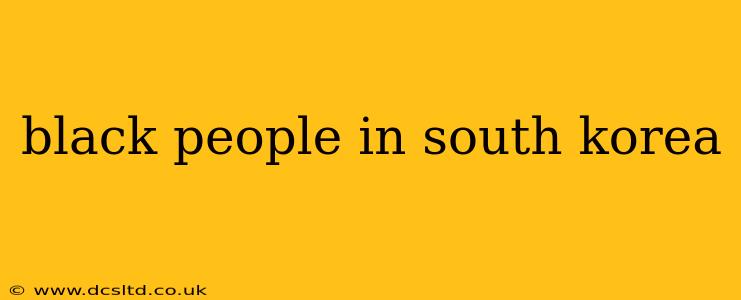South Korea, a nation known for its technological advancements and vibrant culture, is increasingly becoming more diverse. While still predominantly homogenous, the presence of Black individuals is growing, albeit often accompanied by unique challenges and experiences. This article delves into the complexities of being Black in South Korea, addressing common questions and offering insights into the evolving landscape of race relations.
What is it like being Black in South Korea?
The experience of being Black in South Korea is multifaceted and varies greatly depending on individual circumstances, such as length of stay, profession, and social circles. Many Black expats report feeling initially isolated due to the language barrier and lack of cultural familiarity. While increasing numbers of Koreans are becoming more open and accepting, prejudice and discrimination, stemming largely from a lack of exposure to diverse populations, unfortunately remain a reality for many. This can manifest in subtle microaggressions or more overt instances of racism. However, many Black individuals also report positive experiences, finding welcoming communities and forming meaningful connections with both Koreans and other expats. The experience is not monolithic, and generalizations should be avoided.
What are the challenges faced by Black people in South Korea?
Racism and Discrimination: This is perhaps the most significant challenge. It ranges from subtle biases and stares to blatant racism. This can impact social interactions, job prospects, and even access to services. The lack of representation in media and public life further exacerbates this issue, reinforcing stereotypes and misunderstandings.
Language Barrier: The language barrier is a significant hurdle for many Black expats. Navigating daily life, finding employment, and building relationships becomes significantly more challenging without proficiency in Korean.
Cultural Differences: Adjusting to Korean culture, which can be quite different from Western cultures, can be difficult. Understanding social etiquette, customs, and expectations takes time and effort.
Lack of Representation: The underrepresentation of Black individuals in Korean media and public life contributes to a lack of understanding and perpetuates stereotypes.
How many Black people live in South Korea?
Precise figures on the Black population in South Korea are difficult to obtain due to a lack of specific ethnic data collection in national censuses. However, anecdotal evidence and observations from various communities suggest a growing, albeit still relatively small, Black population, primarily composed of expats, international students, and their families.
Are there Black communities in South Korea?
While not as large or established as in some other countries, small but growing Black communities exist in major cities like Seoul, Busan, and Incheon. These communities often serve as support networks, providing a sense of belonging and helping individuals navigate the challenges of living in a foreign country. These networks often connect through social media groups and local events.
What is the future of Black people in South Korea?
The future of Black people in South Korea hinges on continued efforts to promote inclusivity, understanding, and diversity. Increased representation in media, education about different cultures, and government initiatives to combat discrimination are crucial steps. As South Korea continues to globalize, the integration of diverse communities is essential for its continued growth and prosperity.
Is South Korea a good place for Black people to live?
Whether South Korea is a "good" place for Black people to live is subjective and depends heavily on individual experiences and expectations. While challenges exist, many Black individuals find South Korea to be a rewarding place to live and work, appreciating its safety, efficient public transportation, and vibrant culture. It’s essential to weigh the potential challenges against the personal advantages and to thoroughly research the experience of other Black expats before making a decision.
This article aims to provide a balanced and informative overview of the experiences of Black people in South Korea. It is important to remember that these experiences are varied and individual, and this information should not be interpreted as a definitive statement on the entirety of the Black experience within the country.
